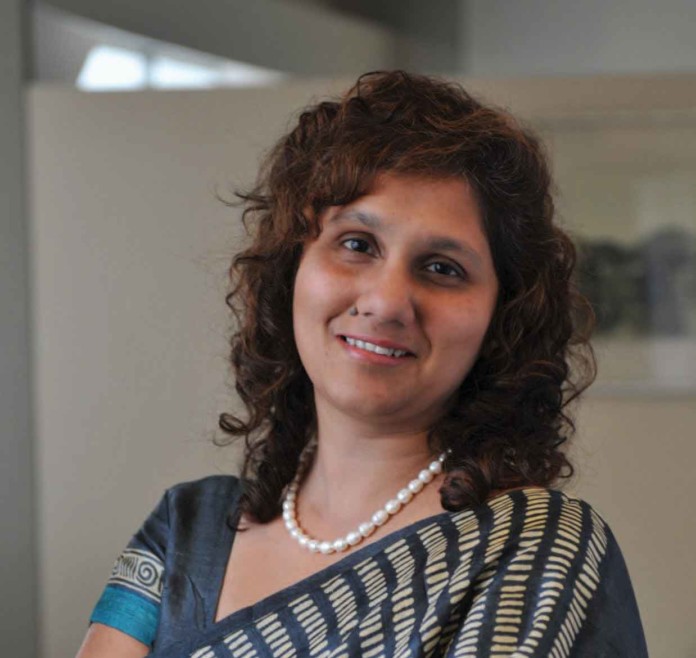Bankers are used to the phrase ‘deep in debt’ but YES BANK is attempting a full circle of influence surrounding sustainability and is immersed deeply in it to make a difference to all stakeholders. Namita Vikas takes Benedict Paramanand, Editor of SustainabilityNext, through its initiatives and their impact so far
What is YES BANK’s corporate philosophy on sustainability in India?
YES BANK has adapted a strategic approach towards sustainability. The Bank believes in linking sustainability with stakeholder value creation through innovative business solutions and weaving sustainability principles into its core business strategy and processes.
Elaborate on the initiatives and outcomes in the last five years
High E&S risks are generally associated with sectors such as, infrastructure, agriculture, construction, manufacturing and extractive industries. Any adverse development that increases the E&S risks of an organization’s operations may seriously undermine its financial and operational feasibility. In many cases, these include reputational, credit or liability risks, thus emphasizing the need for proactive steps to recognize and alleviate them. YES BANK is the first Indian commercial bank to have voluntarily incorporated environmental and social risk issues into its overall risk assessment by establishing Environmental and Social Policy (ESP).
Most importantly, it is crucial to be relevant to business. If we are able to answer the question ‘what is in it for me?’ it would be the highest success parameter in making the business case for sustainability.
While financial institutions are proficient in traditional risk evaluation methods, there is a considerable gap in addressing environmental and social risks within their risk assessment frameworks. With an aim of filling this gap, YES BANK launched the SUSTAINABILITY SERIES as one of the first initiatives in India to focus on increasing Environment & Social (E&S) Risk Awareness within the financial sector. The United Nations Environment Program – Finance Initiative (UNEP-FI) and Deutsche Gesellschaft für internationale Zusammenarbeit (GIZ) GmbH are our partners for this initiative. At the inaugural session of the Series, national and international experts brought out multiple aspects of environment and social risks and mechanisms to mitigate them for the financial sector.
Mainstreaming sustainability amongst stakeholders
“YES COMMUNITY” is a unique community engagement initiative at YES BANK that aims to connect with the local communities residing around our branches on socially and environmentally pertinent issues. The BANK uses its branches as knowledge sharing centers or ‘Choupals’ to build strong community relations thus moving its relationship beyond transactional value. So far, the BANK has conducted over 1200 events across branches with over 120,000 community members participating in the activities.
The program has grown considerably in the past through a social calendar that is based on national and international days of importance, such as the World Water Day, National Energy Conservation Week, among others. Impacting Environment and Society through Innovative Solutions.
Through Inclusive and Social Banking (ISB), YES BANK works with the unbanked and under-banked population in urban and rural India by leveraging the Bank’s branch network, technology edge and relationship capital.
YES MONEY
YES MONEY is a unique new social innovation designed to meet the remittance need of India’s vast migrant, unbanked and under-banked population in India. This remittance service has leveraged existing cash remittance technologies, India’s vast spread of local, family owned retail stores (kirana) and the pan-India commercial banks branch network using a custom built, multi-channel platform – Remittance Knowledge Bridge.
YES SAHAJ
The innovative micro-ATM model is a cost effective and scalable Mobile Transaction solution bringing the mobile teller machine to the under-banked customers in rural India. YES SAHAJ has defeated the need of the user to travel to the bank by bringing banking closer to the population through its vast Business Correspondent Agent network.
YES Livelihood Enhancement Action Program (YES LEAP)
It provides credit, saving and insurance facilities to Self Help Groups through various NGOs acting as Business Correspondents of the Bank. By the end of FY 2012-13, YES LEAP has extended Financial Inclusion services to close to 500 villages, spread across 12 states, working through 32 Business Correspondents linked to 40 Branches. The Bank has extended FI services to over 72,000 households through this program.
Proactive Investments for positive Environmental and Social Outcomes
YES BANK views climate change as an opportunity and believes it could spur the development and adaption of cleaner and newer technologies into mainstream market. Through sustainable finance, the Bank addresses the challenge of long term sustainability goals and shorter term financial horizons. YES BANK’s Corporate Finance unit has an active investment and advisory portfolio covering clean energy, water, transportation and waste management. The unit has within it a specialized investment advisory team, Sustainable Investment Banking (SIB) that has worked on several key advisory deals during the year.
Sustainability Research Initiatives
To conduct research around new progressive areas on sustainability that culminates into policy advocacy, YES BANK has partnered with national and international organizations such as the TERI – BCSD and GIZ to release knowledge papers on contemporary social and environmental issues.
Employee Engagement
In line with the Bank’s responsible banking philosophy YES BANK has initiated a unique employee engagement program, ‘YES i CARE’, to sensitise employees on sustainability. Under ‘YES i CARE’ initiative, the Bank has created an annual calendar of socially and environmentally relevant national and international days at which employees participate. These monthly activities have helped the Bank involve its employees on socially and environmentally relevant days such as the National Energy Conservation Week and the World Water Day.
What is the future strategy and plans in this year?
YES BANK’s focus being stakeholder value creation, the Responsible Banking team at YES BANK continuously directs its efforts around the 3 “I” approach- Influence positively, Innovate for BoP markets, and Invest in green businesses. The strategy revolves around building stakeholder value through financial inclusion, catalyzing socially responsible investments and capacity building of social enterprises in order to accelerate their growth.
This year the bank has launched YES BANK Saevus Natural Capital Awards to showcase responsible practices on natural capital consumption, accounting mechanisms within organizations and conservation within the industry and civil society in partnership with Saevus, India’s premium wildlife and natural history web portal.
We are also in the process of publishing a standalone sustainability report as per GRI 3.1 guidelines this year.
a. List achievements, if any, with some details.
I feel actualization of the bank’s overall sustainability strategy has been our biggest achievement. The Bank has been successful in catalyzing a sustainability dialogue in the country through its various initiatives. With business units active in the areas of financial inclusion, microfinance, affordable housing, agriculture, renewable energy, and development banking, YES BANK has created an impact among the most disadvantaged stakeholders in the society to catalyze a shared sustainable future.
b. As a private sector bank, what are the challenges that you face in practicing sustainability?
I feel the biggest challenge thus far has been to decipher ‘Sustainability’ and communicate to the stakeholders in technical lexicon. There is a need for evangelism to overcome some critical barriers like ‘perceived lack of value in developing such initiatives’. We need to create a strong communication medium to engage with key influencers and stakeholders to translate the esoteric subject of sustainability into pragmatic business practice. Most importantly, it is crucial to be relevant to business. If we are able to answer the question ‘what is in it for me?’ it would be the highest success parameter in making the business case for sustainability.










